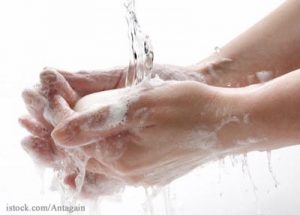Today is the 8th annual Global Handwashing Day. This day is to help increase awareness and understanding of hand washing as a way to prevent disease, especially foodborne illness, around the world. In fact, researchers estimate that if everyone around the world routinely washed their hands, a million deaths could be prevented every year.
 The CDC reports that although people around the world clean their hands with water, very few use soap to wash their hands. Soap and water available for hand washing may be less available in developing countries, and even when soap is available, it is often reserved for bathing and laundry instead. Washing hands with soap removes bacteria much more effectively than washing with plain water.
The CDC reports that although people around the world clean their hands with water, very few use soap to wash their hands. Soap and water available for hand washing may be less available in developing countries, and even when soap is available, it is often reserved for bathing and laundry instead. Washing hands with soap removes bacteria much more effectively than washing with plain water.
About 1.8 million children younger than the age of 5 die every year from diarrheal disease and pneumonia. those are the top two causes of death among young children around the world. Washing hands with soap can reduce the incidence of diarrhea among this age group by 30% and reduce respiratory infections by 20%. Encouraging hand washing in school helps reduce illness days, and can help whole communities stay healthier.
The CDC says that hand washing is like a do-it-yourself vaccine with five steps: Wet, Lather, Scrub, Rinse, Dry. Wet your hands with clean, running water, turn off the tap, and apply soap. Lather your hands by rubbing them together with the soap. Be sure to lather the backs of your hands, between your fingers, and under your nails. Scrub your hands for at least 20 seconds. To properly time this step, hum the “Happy Birthday to You” song from beginning to end two times. Then rinse your hands well under cleaning, running water, and dry your hands using a clean towel or air dry them. If someone in your home has a diarrheal illness, using a paper towel to dry your hands could help prevent disease.
They have made a video showing how to correctly wash your hands. The CDC also has developed a step by step instructional guide on how to accomplish this simple task.
Washing your hands is especially important after going to the bathroom, blowing your nose, changing diapers, before preparing and serving food, and after handling raw meats, poultry, seafood, and eggs. Remind children to wash their hands often.
While hand sanitizers can reduce the number of germs on your hands in some situations, they do not eliminate all types of germs, so don’t get a false sense of security if you use them. And remember that hand sanitizers aren’t as effective when hands are visible dirty or greasy. Any hand sanitizer you use should contain at least 60% alcohol to be effective.
And remember, especially if you work in a school, daycare, healthcare setting, or making or serving food to the public, that keeping fingernails trimmed and cleaned is an important part of hand hygiene. Fingernails should be kept short. Longer fingernails can harbor more dirt and bacteria than short nails. And all equipment for clipping or grooming nails should be properly cleaned and sterilized.




